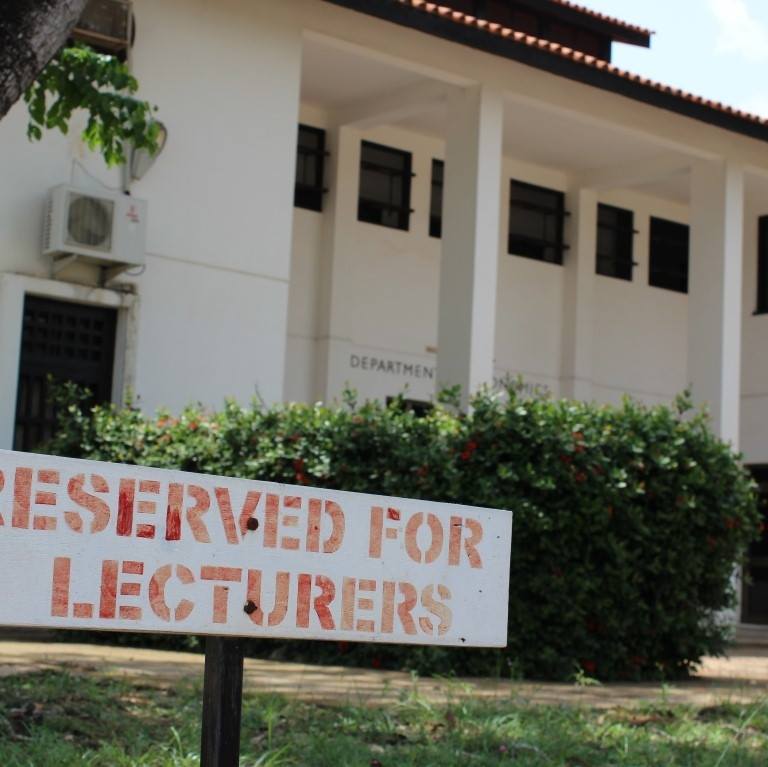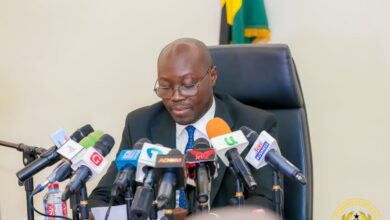Ideas into Action: BoG-UG Chair Turns Lecture Halls into Launchpads for Ghana’s Economic Transformation

At the heart of every great economy is an idea born not in a government office, but in a classroom.
That was the message from the Governor of the Bank of Ghana (BoG), Dr. Johnson Pandit Asiama, as he inaugurated the BoG Chair in Finance and Economics at the University of Ghana (UG), Legon.
The UG campus came alive with renewed purpose and promise with the launch of the Chair. But this wasn’t just a ceremonial ribbon cutting. It was a call to action. The time had come to close the longstanding gap between economic theory taught in lecture rooms and the real-life policies that shape the destinies of millions.
Standing before students, faculty, and policymakers, Dr. Asiama spoke passionately about bridging the long-standing gap between theory and practice. “Economics,” he said, “is not just theory; it’s a tool for transformation. A bridge between data and dignity.”

For too long, many students had left lecture halls filled with ideas but unsure how those ideas translate into Ghana’s economic decisions, from setting interest rates to regulating mobile money. This new Chair, he said, aims to change that.
“Economics,” Dr Asiama said, “is not just a subject. It is a tool. It is the foundation of dignity, the driver of opportunity, and the protector of stability. It should not remain locked in classrooms or textbooks. It must live and breathe in the lives of our people.”
Through deeper collaboration with the university, the BoG plans to create research hubs where students work with real-time data. Imagine a final-year economics student analyzing inflation trends not just for a grade, but to feed into actual central bank policy. Or sitting in a policy lab that tests ways to stabilize the cedi using models they helped build.
And it doesn’t stop at school.
Dr. Asiama unveiled the Governor’s Future Leaders Fellowship, a bold initiative to groom the next generation of Ghanaian economists. Top-performing graduates will be given scholarships, internships, and exposure to leading global institutions. But the goal is clear, that, they must return to Ghana. To build. To lead. To transform.
The BoG Chair, now held by Professor Paul Alagidede, is designed to foster deeper collaboration between academia and central banking. It will serve as a platform for high-level research, practical training, policy experimentation, and intellectual exchange between the BoG and the UG.

Prof Alagidede was charged with a mission: to push the frontiers of monetary research in Africa, not just to publish papers, but to shape policy. To mentor students who won’t just theorize but act.
For the students gathered, the message was clear: economics is no longer something that happens “out there.” It’s happening here, and they are expected to be part of it.
A key component of the partnership is the proposed establishment of real-time research hubs where students and faculty can work on live data from the central bank. Through these hubs, students can engage with ongoing research around inflation targeting, exchange rate volatility, monetary policy transmission, and financial sector regulation. The goal is to create an ecosystem where classroom assignments evolve into policy briefs, where thesis papers become policy inputs, and where academic minds are shaped to think critically about Ghana’s most pressing economic challenges.
“Read the Monetary Policy Statement,” Dr. Asiama urged. “Debate the Fiscal Strategy Document. Ask hard questions.”
In that moment, the distance between the lecture room, the boardroom, and the trading room shrank. Economics became more than a course. It became a calling.
This Chair isn’t just about research or rankings. It’s about reshaping Ghana’s economic future, by empowering its youth to lead it.
The BoG Chair in Finance and Economics is more than an academic endowment. It is a symbol of institutional faith in Ghana’s youth, a long-term investment in national intellectual capacity, and a concrete step toward a more inclusive, data-driven, and homegrown policy culture.
As Ghana continues to navigate global shocks, domestic inflationary pressures, and an evolving financial landscape, the role of research, innovation, and critical thinking cannot be overstated. The future of Ghana’s economy may well depend on how effectively the next generation can transform ideas into solutions, and the lecture room into a launchpad for policy innovation.
With this Chair, the BoG has thrown down the gauntlet. It is now up to students, researchers, and academic leaders to rise to the challenge.




